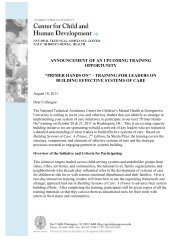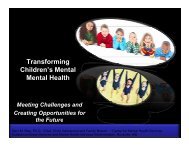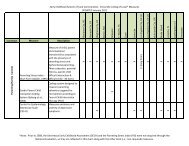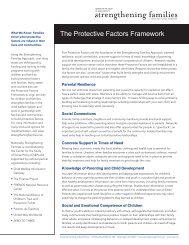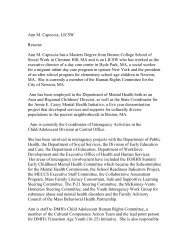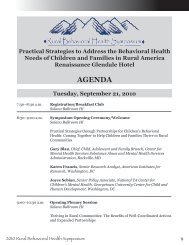Training Institutes 2012 - National Technical Assistance Center for ...
Training Institutes 2012 - National Technical Assistance Center for ...
Training Institutes 2012 - National Technical Assistance Center for ...
You also want an ePaper? Increase the reach of your titles
YUMPU automatically turns print PDFs into web optimized ePapers that Google loves.
WORKSHOPS<br />
WORKSHOP #17 8:30 AM FRIDAY • 3:30 PM SATURDAY • GAINESVILLE 1-2<br />
An Innovative Approach to Residential Treatment: Shorter Stays, Better Outcomes<br />
OBJECTIVES—Participants will learn:<br />
1. To identify the elements of effective residential care<br />
2. How to employ strategies <strong>for</strong> effective partnerships when developing new approaches<br />
3. To describe the key attributes of this model<br />
4. To explain why data collection is critical to program sustainability<br />
5. To analyze the outcomes of this approach<br />
This Workshop will describe a short-term residential model <strong>for</strong> increasing the effectiveness of residential treatment as a<br />
component of a system of care. The strategies to be presented are based on a white paper developed by Magellan Health<br />
in response to concerns about the reliance on residential treatment <strong>for</strong> children and adolescents with serious emotional<br />
disturbance and the underuse of evidence-based alternative treatments, “Perspectives on Residential and Community-<br />
Based Treatment <strong>for</strong> Youth and Families.” The design and development of the short-term residential model was a<br />
collaborative ef<strong>for</strong>t of Magellan’s Lehigh Valley Care Management <strong>Center</strong>, MCC Warwick, Shawnee Academy, and<br />
Children’s Home of Reading.<br />
The key components of this model are small caseloads, family involvement, comprehensive discharge planning and<br />
follow up, and outcome measurement. Small staff to youth ratio allows the therapist and a case manager who act as a<br />
“team” approach to deliver intensive therapy <strong>for</strong> the child and family, as well as aftercare planning. Family involvement<br />
begins prior to admission and continues after a child is discharged. Therapy often occurs in the home environment<br />
allowing the child, family, and therapist to address situations that typically occur in the home. Discharge planning begins<br />
on the day of admission, with case manager arranging services and helping the family to activate a support plan that is<br />
tailored to their needs and incorporates natural supports within their community. Data collection is monthly and<br />
includes age, gender, diagnosis, custody status, presenting issues, average length of stay, aftercare plan, natural supports,<br />
and re-admissions to out of home placements. Following 24 months of data comparing this approach with ‘traditional’<br />
residential, the model has significantly reduced lengths of stay and readmissions following treatment. Faculty will share<br />
strategies <strong>for</strong> implementing this approach in other communities and states.<br />
Specific topics to be covered include:<br />
• The impetus <strong>for</strong> change and the role of research in developing this approach<br />
• Process of program development, including key strategies <strong>for</strong> engaging providers as partners in a new approach<br />
• Effective aspects of the approach, what really makes the approach successful<br />
• Data collection and outcomes and the importance of data and tracking outcomes <strong>for</strong> sustainability.<br />
• Lessons learned and steps <strong>for</strong> implementation in participants’ communities and states<br />
Participants will select one aspect of this approach and plan <strong>for</strong> use within their communities and then report back. The<br />
faculty team includes the family perspective on the importance of engaging families, a clinical perspective to ensure<br />
effective services and supports, and the role of policy in supporting programmatic and systemic change.<br />
MODERATOR/PRESENTER: Patricia Hunt, Director of Child & Family Resiliency Services, Public Sector<br />
Solutions, Magellan Health Services, Turner, ME<br />
John Lees, L.S.W., Child/Adolescent Care Management Supervisor, Lehigh Care Management <strong>Center</strong>—Clinical,<br />
Magellan Behavioral Health of Pennsylvania Inc., Bethlehem, PA<br />
78 <strong>Training</strong> <strong>Institutes</strong> <strong>2012</strong>



